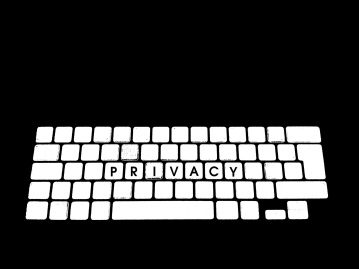Photo courtesy of flickr
It has been said that sharing is caring, but what about the things you aren’t knowingly sharing? This ranges from your significant other reading your texts over your shoulder to more serious offenses such as going through your personal accounts, phone, space, etc. without your knowledge. In a relationship, there has to be some boundaries in order to keep both of you from feeling like your privacy is being violated.
How does one determine these boundaries? Well, it’s simple: talk to your partner about what is and isn’t okay in regards to privacy. Doesn’t sound so simple? Well, try it anyway.
Discussion about privacy is one of the most important conversations you can have as a couple whether you have just started dating, cohabitating, or married for 10+ years. A single conversation now can prevent a more serious and devastating conversation down the road when one or both of you have had your privacy violated. It is easier to prevent than to repair. With that in mind, here is a list of things to think about and address before it is too late.
Cell Phones
When is it okay to go through your significant other’s phone without their knowledge? The answer should be never. Whether or not they have something to hide from you, it is more than likely that your significant other wouldn’t want you going through their phone without their knowledge. You may not be hiding anything on your phone (more than your obsession for cat memes), but you likely wouldn’t want your significant other going through your phone either.
If you’re in a relationship and you find your fingers itching to scroll through your significant other’s phone, there’s likely a much larger issue under the surface than just wanting to check up on them. Let’s be honest, the main reason to go through your significant other’s phone is because you want to see who they are talking to…because you think they might be cheating. If this is sounding all too familiar, it is time for you to take a step back and address what it is specifically that is making you feel this way about your partner and address that with them in person, not their phone.
Unless you both agree that your phones are open books to each other, so to speak, then assume they are off-limits without permission and without suspicion. Cohabitating couples may want to discuss whether or not it is acceptable to answer phone calls from specific people (i.e. your parents) if you are in the shower or otherwise unavailable. When in doubt if something is okay when it comes to your significant other’s cell phone, just leave it alone. They can always call whoever it is back.
Journals
Don’t ever go through your significant other’s journal. There is nothing you need or want to find in there. That is their personal space and it needs to be respected. End of story.
Don’t do anything with their email account without their permission and don’t be insulted if they don’t want to share an email account with you, grant you unlimited access to their account, etc. Even if they pulled up their email on your computer and left it open. Even if they saved their email password on your computer. Even if you use their computer, phone, tablet, spaceship, smart car, or what have you and it is just sitting there open asking you to scroll through its depths of history. Do not pass go, do not collect $200, and do not go through their email without permission.
Social Media Accounts
With the combination of public information along with private messaging options, your significant other’s social media account can be tempting to go through. With these, it is probably best to discuss with your partner what is and isn’t acceptable online behavior (which should be the same for you both –no double standards here!) and go from there. For example, the two of you might agree to not wanting to publicize your relationship issues to all your friends and followers online.
Personal messaging is where social media tends to make people weary. While it is a handy tool for keeping in touch with others, it has also been known to be a playground for inappropriate conversations and sometimes even a way to cheat. However, this does not make it okay to go through your significant other’s accounts and personal messages. Trust here is key. You likely both have the same social media accounts with the same personal messaging features and you both will have to learn to trust that the other isn’t misusing these features either.
For those who have had significant others who “scope out” every person you friend/follow/add/connect with/associate with on social media, you will understand this following guideline: it is not okay to go through all of your significant other’s people (i.e. it is not okay to look up all 543 of their friends on Facebook, follow all of their followers on Twitter, etc.) If you see your significant other interacting questionably with someone on social media and this concerns you, skip snooping and express your concerns to your partner in a non-accusatory manner. More than likely, you have misread the situation and your significant other will be able to clear things up for you and, ideally, your concerns will be on their mind when they interact with that person down the road.
Cyber stalking
A preliminary google search before a first date? Sure, maybe that’s okay. Combing through any and all information about your significant other, including but not limited to the people they are connected with online? Not so much.
Opening someone else’s mail is a felony. Don’t do it unless it is specifically addressed to the two of you.
Desk areas, purses, wallets, cars, or other personal space
Especially when co-habitating, it is important for both of you to feel like you have a space of your own in a home where everything is everyone’s. Unless you are truly searching for something you need (i.e. the water bill), don’t go through their personal space without permission or previous discussion. Grab what you need and get out. Don’t use it as an excuse to snoop. Respect that space whenever you can. It will keep you both sane. And no, do not make up reasons.
Red Flags
While it is still not an okay to invade their personal space or privacy, there are some things to keep an eye out for: a once okay to go through drawer suddenly has a lock on it that you are not allowed to have the key/combo to, double standards in regards to appropriate or inappropriate behavior, serious changes in rules or behavior without logical explanation, money missing from a joint account, or out of the ordinary anger/aggression when you try to talk to them about privacy boundaries or violations, significant amounts of time unaccounted for, the discovery of your significant other’s online dating account, etc.
What can you do about these red flags? The best thing you can try to do is talk to your partner about them. If they aren’t open to conversation, it might be time to reconsider your relationship.
So your privacy has been violated. What now?
As someone who has had experience with almost all of these situations, I can tell you first hand that invasion of your privacy is one of the most damaging things to a relationship. It shows lack of respect and lack of trust, a combination that is hard to bounce back from. While your significant other can likely make excuses until your ears are tired and penguins are frequenting beaches, it is ultimately up to you to determine whether this is something you can move forward from. Likely, if it happens once it will happen again and again until whatever the deeper issue is has been resolved (which will take time). You can sit down with your significant other and discuss what is and isn’t okay going down the road after a first offense and hopefully that will prevent further damage to the trust. Has your privacy been violated two or more times? It might be time to move on. Where there is no respect and no trust, there can only be a shaky future.


Reblogged this on A Dose of Kyle.